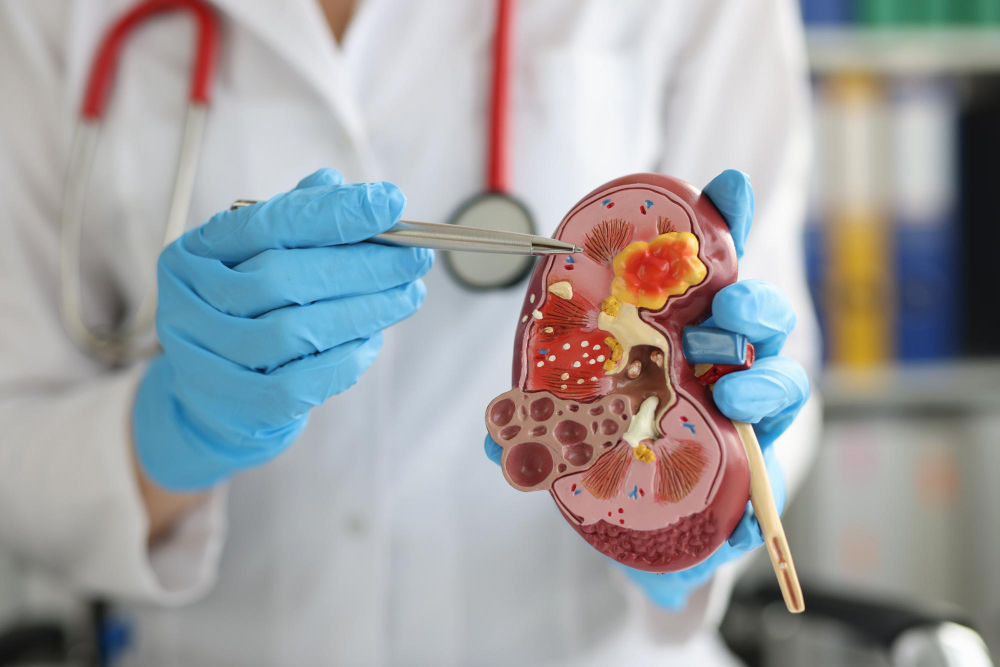Kidney stones are hard deposits made of minerals and salts that form inside your kidneys. They can affect any part of your urinary tract, from your kidneys to your bladder. Often, stones form when the urine becomes concentrated, allowing minerals to crystallize and stick together.
The Formation Process
The process begins when urine contains more crystal-forming substances such as calcium, oxalate, and uric acid than the fluid in your urine can dilute. At the same time, your urine may lack substances that prevent crystals from sticking together, creating an ideal environment for kidney stones to form. Understanding this process highlights the importance of maintaining a proper balance in your diet and hydration.
Symptoms and Diagnosis
Symptoms of kidney stones can vary depending on the size and location of the stone. Common signs include severe pain in the side and back, pain during urination, and persistent urge to urinate. Diagnosing kidney stones typically involves imaging tests such as ultrasounds or CT scans, which help to determine the size, shape, and location of the stones.
Risk Factors
There are several risk factors for developing kidney stones, including genetic predisposition, dietary habits, and certain medical conditions like hyperparathyroidism. Individuals who have a family history of kidney stones or who have had them before are more likely to develop them again. Recognizing these risk factors can help you take preventive measures more effectively.
Common Types of Kidney Stones
There are several types of kidney stones, each with unique characteristics and causes. Understanding these types can aid in prevention and treatment.
Calcium Stones
Calcium stones are the most common type and are often composed of calcium oxalate. Factors that increase calcium oxalate in your urine include high doses of vitamin D, dietary choices, and metabolic disorders. To prevent these stones, it’s crucial to balance calcium intake with oxalate consumption.
Struvite Stones
Struvite stones typically form in response to an infection, such as a urinary tract infection (UTI). They can grow quickly and become quite large, sometimes with few symptoms. Prevention involves treating underlying infections promptly and maintaining good urinary health.
Uric Acid Stones
Uric acid stones can form in people who don’t drink enough fluids or lose too much fluid, such as through chronic diarrhea or malabsorption. They are also more likely to occur in individuals with a high-protein diet. Managing fluid intake and moderating protein consumption can help prevent these stones.
Cystine Stones
Cystine stones form in people with a hereditary disorder known as cystinuria, which causes the kidneys to excrete too much of certain amino acids. These stones are rare but can be persistent. Treatment often involves medications to reduce cystine levels in the urine and lifestyle modifications.
Diet and Kidney Stone Prevention

Diet plays a crucial role in the prevention of kidney stones. What you eat can significantly affect the likelihood of stone formation.
Foods to Avoid
Certain foods are known to contribute to the formation of kidney stones. Reducing or eliminating these from your diet can be beneficial.
High-Oxalate Foods
High-oxalate foods can contribute to the formation of calcium oxalate stones. These include:
- Spinach
- Rhubarb
- Beets
- Nuts and seeds
- Dark chocolate
Limiting these foods can be particularly important for individuals who have had calcium oxalate stones in the past. Instead, focus on a balanced diet that includes a variety of low-oxalate options.
High-Sodium Foods
A high-sodium diet can increase the amount of calcium in your urine, leading to kidney stones. Limit foods such as:
- Processed foods
- Canned soups
- Fast food
- Salty snacks
Reducing sodium intake can not only help prevent kidney stones but also benefit your overall cardiovascular health. Opt for fresh, whole foods and use herbs and spices for flavor instead of salt.
High-Purine Foods
Certain foods high in purines can lead to increased uric acid production, contributing to uric acid stones. Examples include:
- Organ meats
- Anchovies
- Sardines
- Beer
Moderating your intake of these foods can reduce the risk of uric acid stone formation. Consider replacing them with lower-purine protein sources like poultry and eggs.
Foods to Include
Incorporating certain foods into your diet can help prevent kidney stones.
Calcium-Rich Foods
Contrary to what you might think, calcium in your diet can help prevent stones. Good sources include:
- Dairy products
- Leafy greens
- Almonds
Adequate dietary calcium binds with oxalate in the intestines, preventing it from being absorbed into the bloodstream and excreted by the kidneys.
Citrate-Rich Foods
Citrus fruits like lemons, limes, and oranges can help prevent stones. They contain citrate, which helps prevent calcium from binding with other compounds.
Including these fruits in your diet can help maintain optimal urinary pH levels and reduce the risk of stone formation.
Hydration Tips
Staying well-hydrated is one of the most effective ways to prevent kidney stones. Here’s how you can ensure you’re drinking enough:
- Drink Plenty of Water: Aim for at least 8-10 glasses a day. Water helps dilute the substances in urine that lead to stones.
- Add a Splash of Lemon: Lemon juice has citrate, which can help prevent stones.
- Avoid Sugary Drinks: Beverages like soda can increase the risk of stones.
Proper hydration helps maintain a healthy urinary system and reduces the risk of kidney stones by diluting waste products that can form stones.
For a more practical overview, check out our Top 5 Tips to Prevent Kidney Stones, where we break down key strategies to lower your risk.
Lifestyle Changes for Kidney Stone Prevention

In addition to diet and hydration, certain lifestyle changes can further reduce your risk of developing kidney stones.
Exercise Regularly
Regular physical activity can help maintain a healthy weight and balance the minerals in your body, reducing the risk of stone formation.
Choosing the Right Exercises
Engage in exercises that you enjoy, such as walking, swimming, or cycling, to ensure consistency. Regular exercise helps improve circulation and supports kidney function, promoting overall health.
Building a Routine
Aim for at least 150 minutes of moderate-intensity exercise each week. Establishing a routine can help you stay committed and make physical activity a regular part of your life.
Monitor Your Weight
Being overweight can increase the risk of kidney stones. Maintain a healthy weight through diet and exercise.
Understanding the Connection
Excess weight can lead to insulin resistance and changes in urinary composition, increasing the risk of stones. A balanced diet and regular exercise can help you achieve and maintain a healthy weight.
Setting Realistic Goals
Set achievable weight loss goals and track your progress. Small, consistent changes in your lifestyle can lead to significant improvements over time.
Reduce Animal Protein
High amounts of animal protein can increase the risk of uric acid stones. Limit consumption of:
- Red meat
- Poultry
- Eggs
For more detailed dietary guidelines to prevent kidney stones, refer to this resource from the Urology Care Foundation.
Exploring Alternatives
Consider incorporating more plant-based proteins like beans, lentils, and tofu into your meals. These options provide essential nutrients while reducing the risk of stone formation.
Moderation is Key
If you choose to include animal protein in your diet, practice moderation and balance it with ample servings of fruits and vegetables. This approach can help you maintain a healthy urinary system.
Manage Stress
Stress can contribute to the formation of kidney stones. Techniques such as meditation, yoga, or deep breathing can help manage stress levels.
The Impact of Stress
Chronic stress can lead to hormonal imbalances and affect your body’s ability to process minerals, increasing the likelihood of stone formation. Taking time to relax and unwind is essential for kidney health.
Incorporating Relaxation Techniques
Integrate stress-reducing practices into your daily routine. Even a few minutes of mindful breathing or gentle stretching can make a significant difference in your stress levels.
Consult with a Healthcare Professional
While these tips can significantly reduce the risk of kidney stones, it’s important to consult with a healthcare professional, especially if you have a history of stones or other risk factors. They can provide personalized advice and recommend appropriate tests or treatments if necessary.
Personalized Risk Assessment
A healthcare provider can assess your specific risk factors and guide you in making effective lifestyle changes. They may recommend tests such as urine analysis to identify any imbalances.
Ongoing Monitoring
Regular check-ups and monitoring can help detect any potential issues early on. Your healthcare provider can adjust your prevention plan as needed based on changes in your health status.
Exploring Treatment Options
If you do develop kidney stones, your healthcare provider can discuss various treatment options with you. These may include medications, dietary modifications, or in some cases, surgical procedures.
Conclusion
Preventing kidney stones involves a combination of dietary, hydration, and lifestyle changes. By understanding which foods to avoid, staying hydrated, and making healthy lifestyle choices, you can significantly reduce your risk of developing kidney stones. Remember to consult with a healthcare provider for tailored advice and support.
Taking proactive steps today can help you avoid the discomfort and potential complications of kidney stones tomorrow. Stay informed, stay hydrated, and stay healthy!
Embrace a Proactive Approach
Adopting a proactive approach to kidney stone prevention can lead to better overall health and well-being. By integrating these tips into your daily routine, you can reduce your risk and enjoy a healthier life.
Keep Learning
Stay informed about new research and recommendations for kidney stone prevention. Knowledge empowers you to make informed decisions about your health and wellness.
Share Your Journey
Consider sharing your prevention journey with others who may benefit from your experiences. Support and encouragement can make a significant difference in maintaining motivation and commitment.

